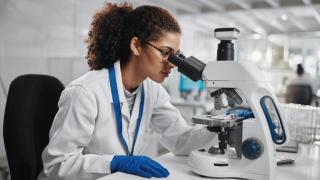
Support the HEARTS Act to solidify reforms into law
We welcome the National Institute of Health’s (NIH) latest move to increase the use of non-animal methods with the creation of a Standardized Organoid Modeling (SOM) Center.
NIH Director, Dr. Jay Bhattacharya, said that the Center would ‘accelerate drug discovery and translational science, offering more precise tools for disease modeling, public health protection, and reducing reliance on animal models’.
Organoids are miniature replicas of human organs grown in laboratories, that can predict how the body will react to a new drug or chemical without using people or animals.
The SOM Center, which will be located at the NIH’s Frederick National Laboratory for Cancer Research in Maryland, will aim to speed-up the creation of organoids, promote best practice and the use of new technologies, and increase funding for organoid projects.
Under the leadership of Dr. Bhattacharya, the NIH has begun to prioritise human-based research. In May 2025, the NIH announced new initiatives to reduce the use of animals in NIH-funded research by focusing on the development and adoption of non-animal methods. This included the creation of the Office of Research Innovation, Validation, and Application (ORIVA) to promote and coordinate non-animal research, and a revision of its grant review process to address potential bias toward animal studies and ensure inclusion of experts in alternative methods.
Then, in July, the agency ended funding for new research grant applications which only use animal testing, and stipulated that all new NIH-funded projects must mention non-animal testing methods. This was announced at the very first joint meeting of the NIH and Food and Drug Administration to discuss the prioritization of the replacement of animals in research and testing.
These initiatives are all closely aligned with the aims of the Humane and Existing Alternatives in Research and Testing Sciences (HEARTS) Act, which we have long supported. The HEARTS Act also details the creation of a dedicated center to promote, develop and track the use of non-animal methods, the introduction of incentives for grant applications to focus on non-animal methods, and involvement of experts in non-animal testing methods in the review of grant applications.
While the NIH’s initiatives represent important progress, they remain administrative actions that could be altered or reversed by future leadership. In contrast, the HEARTS Act would put reforms like these into law by amending the Public Health Service Act – ensuring that the shift toward human-relevant science is not just encouraged but secured. Legislative action is critical to protect against potential future rollbacks and to firmly embed the prioritization of non-animal methods in federally funded research.
Continued support for the HEARTS Act therefore remains essential.
Our Head of Public Affairs North America, Monica Engebretson, says, “We applaud this significant $87 million investment in organoid-based testing through the launch of the Standardized Organoid Modeling Center. By advancing non-animal, human-relevant methods, this initiative represents a critical step toward replacing outdated animal tests with modern approaches that deliver more accurate, timely, and cost-effective data – ultimately leading to safer and more effective medicines.
“This investment, along with other recent moves at the NIH, continues to align with actions included in the HEARTS Act. Together, the HEARTS Act and NIH’s recent policy shifts signal growing federal alignment around replacing animal testing with modern, human-relevant research methods. You can help keep the momentum going and solidify the move to non-animal methods in the law by asking your Representative to become a sponsor of the HEARTS Act.”
Our short video about the HEARTS Act can be seen on our YouTube channel. We look forward to continuing to support these positive moves, at the NIH and other U.S. federal agencies.
📣 Take Action:
U.S. residents can help to keep building momentum to replace animal tests by asking their Representative to cosponsor the HEARTS Act.
